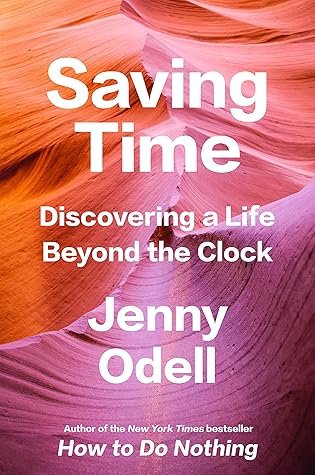More on this book
Community
Kindle Notes & Highlights
by
Jenny Odell
Read between
September 9, 2023 - August 12, 2024
What first appears to be a wish for more time may turn out to be just one part of a simple, yet vast, desire for autonomy, meaning, and purpose.
In the experience economy, nature (and everything else) appears devoid of agency, a backdrop to be consumed.
The Mojave poet Natalie Diaz asks, “How can I translate—not in words but in belief—that a river is a body, as alive as you or I, that there can be no life without it?”
To watch it is to understand that while the sun rises every day, no individual sunrise will ever happen again. Each one gives us an image of renewal, return, creation, and a “new day,”
the goal of capitalism is not free time but economic growth; any time freed up goes right back into the machine to increase profits. Thus the paradox: The factory is efficient, but it also produces “the drive toward the consumption of the person’s time up to its outermost, physical limit.” Or, as the workplace adage would have it, “The only reward for working faster is more work.”
Not all tasks are essential to survival, Burkeman writes, and it isn’t universally “compulsory to earn more money, achieve more goals, realize our potential on every dimension, or fit more in.” The hustle means different things to different people. But if you are truly an achievement-subject who is only wearing yourself down, then I suggest an adjustment of discretion: experimenting with what looks like mediocrity in some parts of your life. Then you might have a moment to wonder why and to whom it seems mediocre.
accepting a life with less of a certain type of ambition is not the same as settling for a life with less meaning.
“We really need to have another reason to be together, which is the real conditions of our lives, rather than an individual ambition.”
Philosopher Ivan Illich worried in 1978 that “innumerable sets of infrastructures in which people coped, played, ate, made friends, and loved have been destroyed,” leaving a barren social landscape of “huge zero-sum games, monolithic delivery systems in which every gain for one turns into a loss or burden for another, while true satisfaction is denied to both.”
Time is not money. Time is beans.
One touches, and one is touched….Less I means more world: ‘Now tiredness was my friend. I was back in the world again.’
Maybe “the point” isn’t to live more, in the literal sense of a longer or more productive life, but rather, to be more alive in any given moment—a movement outward and across, rather than shooting forward on a narrow, lonely track. —
“People do not spring up from the soil like mushrooms,” she writes. “People need to be cared for and nurtured throughout their lives by other people.”[*2]
If aliveness means touching and being touched—being in the world, being kept alive—then the scale between living and dead is inescapably social.
“toxic-waste-dump prison”: “The distinctive new form and function of the prison today is a space of pure custody, a human warehouse or even a kind of social waste management facility, where adults and some juveniles distinctive only for their dangerousness by society are concentrated for purposes of protecting the wider community.”[*3]
In contrast to this hoarding mentality, I want to suggest another way of “increasing” life, one that has to do with the regard missing from social death. This would be a kind of life extension that reaches outward instead of forward, an increase in aliveness for everyone that begins with mutual regard—a world with living beings in it, not zombies.
People and things are alive when we become alive to one another. To regard someone is a balancing of power, an agreement not just to shift one’s center of gravity, but to admit to two centers.
As the civil rights activist Yuri Kochiyama said, life is not yours alone but also “the input of everyone who touched your life and every experience that entered it.”
EVERY PIECE OF writing is a time capsule. It assembles fragments of its own world and sends them onward to a reader who exists in a different one, not just in space but also in time.


